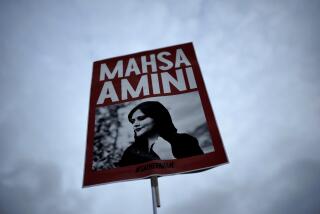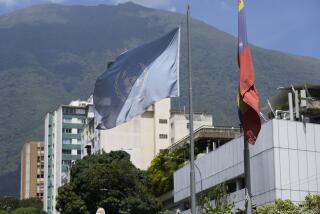Iranian security shuts down human rights celebration
Security officials in Tehran shut down the office of the country’s leading rights defenders Sunday as activists and lawyers gathered there to celebrate the 60th anniversary of the Universal Declaration of Human Rights.
A swarm of uniformed and plainclothes security officers raided Nobel Peace Prize laureate Shirin Ebadi’s Center for the Defense of Human Rights, reportedly taking video footage of offices, making an inventory of equipment and demanding that members leave, telling them authorities had a court order banning any ceremony.
The officers refused to show a paper copy of the order, said Mohammad-Ali Dadkhah, a Tehran human rights lawyer who defends journalists, activists and others accused of political crimes.
“Anyway, we called it a day and wrapped up the gathering,” he said.
No one was arrested, witnesses said.
Ebadi told Agence France-Presse by telephone that the incident would have no effect on the group’s work. “Obviously such a move does not have a positive message for other rights activists in Iran, but my colleagues and I will fulfill our duties under any circumstances,” she told the news agency.
The raid on Ebadi’s small, world-renowned organization was the latest in an official campaign to pressure those calling for human rights and advocating peaceful democratic change in Iran.
Event organizers were planning to give a human rights award to longtime political dissident Taghi Rahmani, a 49-year-old writer who has spent 14 years in prison since the 1979 Islamic Revolution. In a telephone interview, he said bolstering human rights in a country like Iran is a slow, painstaking process.
“As long as we have no civil society, no genuine reform or political development can take place,” he said. “People should be taught to exercise their rights, and government should be taught to hear the voice of the people, and not only for a short time on election day.”
With an ongoing confrontation between Iran and the West over Tehran’s efforts to enrich uranium, Iran’s human rights record has recently reemerged as a matter of international attention. The European Union on Friday issued a statement noting recent “unacceptable” violations, including the simultaneous Nov. 26 executions of 10 criminals and legal moves against women’s rights activists, a noted blogger and a leading trade unionist.
A day earlier, following heated debate, a divided United Nations General Assembly narrowly approved a resolution calling on Iran to improve its human rights record. Iran’s envoy to the U.N. criticized the measure as politicized, hypocritical and full of “falsified and unsubstantiated elements.”
Iran accuses the West of using the country’s human rights record as a political pressure point in an effort to keep the Islamic Republic from attaining regional power and to divert attention from the failings of Western allies in the region. Iran’s envoy to the U.N. on Friday urged the world body to take stronger action to improve the humanitarian situation in the Gaza Strip, whose 1.5 million inhabitants are largely cut off from the world because Israel and Egypt have sealed the coastal enclave’s borders to pressure the ruling Hamas faction.
“It is long overdue for the United Nations and the Security Council to take urgent and meaningful action in order to counter these atrocities and war crimes against the Palestinian people and to help alleviate the sufferings and pains of the people in the Gaza Strip,” said Eshaq Ale Habib, according to the Islamic Republic News Agency.
An Oct. 1 report on the human rights situation in Iran issued by U.N. Secretary-General Ban Ki-moon noted that although the country “has made gains over the past decade or more in the area of economic, social and cultural rights” and strides in providing education and healthcare to the poor, it has backslid on human rights, raising “serious concerns” among international monitors.
The report noted “an increase in rights violations targeting women, university students, teachers, workers” and “ongoing harassment against human rights defenders” as well as tightened restrictions on the media and continued application of the death penalty against juvenile offenders.
The report also raised concerns about the treatment of Iran’s religious and ethnic minorities.
--
Mostaghim is a special correspondent.
More to Read
Start your day right
Sign up for Essential California for news, features and recommendations from the L.A. Times and beyond in your inbox six days a week.
You may occasionally receive promotional content from the Los Angeles Times.






